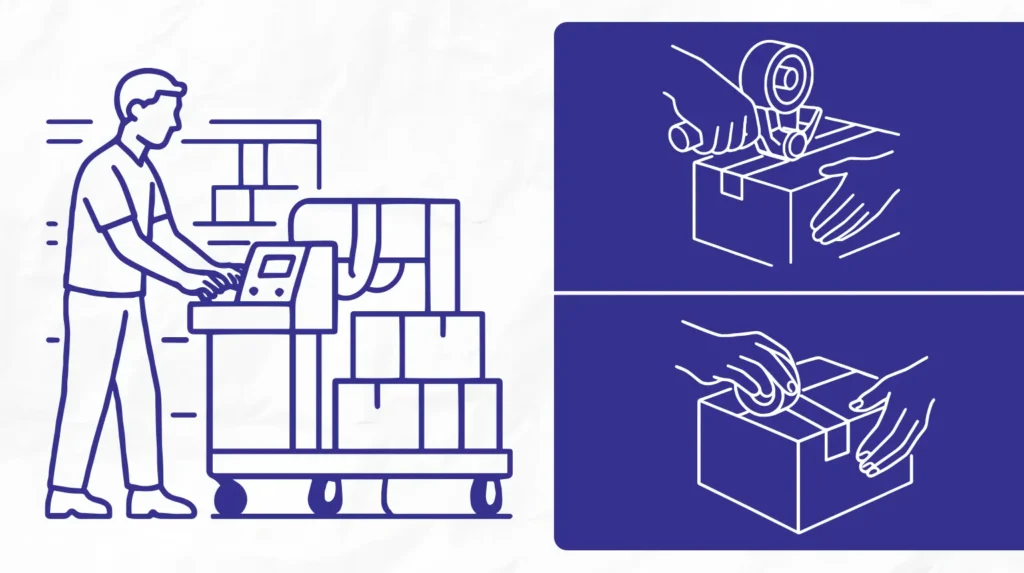
In the evolving landscape of industrial packaging solutions in India, small and medium enterprises (SMEs) are under increasing pressure to enhance efficiency, reduce costs, and deliver consistent quality. Embracing custom packaging solutions and automatic packaging solutions has become essential for companies aiming to stay competitive and scale their operations. Discover the significance of strategic diversification in the context of packaging automation for small and medium-sized enterprises (SMEs) in India.
The Shift Toward Automated and Custom Packaging Solutions
With the rapid rise of e-commerce, heightened consumer expectations, and the influence of Industry 4.0, packaging automation is transforming how SMEs operate. Automated packaging systems streamline repetitive tasks, minimize human error, and enable businesses to achieve faster turnaround times, superior packaging quality, and better inventory management. Leading manufacturers in India now offer a wide range of customizable, high-performance automatic and semi-automatic packaging machines designed for diverse business needs.
Strategies for Diversifying Packaging Automation
1. Start with Scalable and Modular Automation
– Semi-Automatic and Modular Systems: SMEs can begin with semi-automatic machines—such as strapping, wrapping, sealing, or labeling units—that are easy to upgrade as business needs grow. Modular systems allow for phased investments, ensuring flexibility and scalability.
– Custom Packaging Solutions: Partnering with manufacturers that provide tailored solutions ensures that packaging systems can adapt to unique product requirements and changing market demands.
2. Leverage Handheld Packaging Tools
– Handheld Tools: For SMEs not ready for full-scale automation, handheld packaging tools like portable and battery-operated sealers, strapping machines, and handheld labelers offer a cost-effective way to improve speed and consistency while maintaining flexibility. These tools bridge the gap between manual and automated processes, making them ideal for businesses with varied or smaller production runs.
3. Explore Contract Packaging Companies
– Contract Packaging Solutions: Collaborating with contract packaging companies allows SMEs to access advanced packaging technologies and expertise without heavy capital investment. Contract packagers provide services ranging from automated filling and sealing to custom labeling and secondary packaging, enabling SMEs to scale quickly, reduce operational complexity, and focus on core business activities.
4. Integrate Smart and Sustainable Packaging Technologies
– Programmable Integration: Modern automatic packaging solutions often include IoT-enabled sensors, remote access, safety sensors, and real-time data on production rates, machine health, and quality control, helping SMEs make data-driven decisions and optimize processes without manual dependencies.
– Eco-Friendly & Recyclable Packaging: Automation enables precise material usage, reducing waste and supporting sustainability goals—a growing priority for both regulators and consumers.
5. Attend Industry Events and Build Expert Networks
– Industry Expos: Events like PackPlus Expo and India Steel Expo offer SMEs the chance to explore the latest innovations in industrial packaging solutions in India, meet technology providers, and discover automation options tailored to their needs.
Key Reasons to Diversify Packaging Automation in 2025
Increased Productivity: Automated and handheld tools significantly speed up packaging processes, reducing bottlenecks and allowing SMEs to meet higher demand and fulfil the increasingly high turnaround time expectations.
Cost Savings: Reduced manual intervention eventually reduces errors, wastage, and labour wage & safety costs. Automation and contract packaging reduce labor costs by 60% for some industries, minimize material waste by more than 50%, and improve profit margins significantly.
Consistent Quality: Automated systems and professional contract packagers ensure no downtown impacts your supply chain efficiency. Rise your quality standards with uniform packaging quality, reducing defects, damages, and returns.
Scalability: Modular automation and contract packaging allow SMEs to scale operations in line with business growth, without overcommitting capital. These modular packaging equipment are also flexible and scalable in terms of volume.
Regulatory Compliance: Automated systems offer precise labeling and traceability, helping SMEs meet industry regulations and safety standards.
For SMEs in India, diversifying packaging automation is no longer optional—it’s a strategic imperative. By investing in scalable automatic packaging solutions, leveraging automatic and semi-automatic handheld tools, and partnering with contract packaging companies, businesses can unlock new levels of efficiency, quality, and growth. The future of industrial packaging solutions in India is evidently smart, flexible, and tailored—empowering SMEs to compete and thrive in both domestic and global markets.

